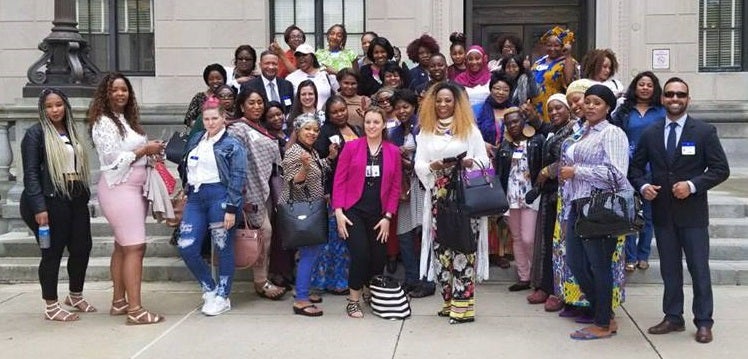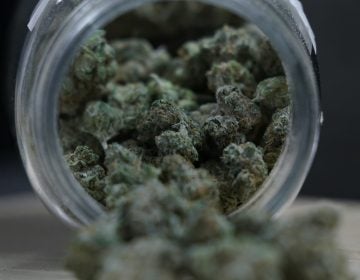New Jersey hair braiders want an end to licensing laws
The natural braiding technique — requiring no coloring, cutting or special tools — appears headed to an exemption from N.J. law requiring practitioners have a license.
Listen 1:49
The New Jersey Hair Braiding Freedom Coalition assembles outside the the State House in Trenton before a committee hearing in May. (Courtesy of Brooke Fallon)
For years, natural hair braiders in New Jersey have been fighting to end a state licensing law that requires them to have a cosmetology license in order to give their clients African-style braids.
They seem to be very near that goal after the recent passage of legislation that would exempt hair braiding from cosmetology licensing requirements. Now that the Assembly and Senate have endorsed the measure, it has gone to Gov. Phil Murphy for his consideration.
Brigitte Nzali was among those calling out for the change.
When she moved from Paris to the United States in 1999, Nzali noticed there were no natural hair-braiding salons in the South Jersey community of Gloucester Township.
It seemed like an ideal opportunity for Nzali who, with her sister, owned a hair-braiding salon in Paris.
So she rented space in a mall plaza and began a business called African and American Hair Braiding.
“I grew up braiding. I was born braiding,” said Nzali, who is originally from Cameroon.
She was not aware that, in New Jersey, braiding requires a cosmetology license. Within months of opening, Nzali said she was slammed with fines adding up to hundreds of dollars.
According to the New Jersey Cosmetology and Hairstyling Act of 1984, cosmetologists and barbers need a license. In order to get that license, the New Jersey State Board of Cosmetology and Hairstyling requires 1,200 hours of training at a beauty school. Tuition for this training can cost up to $17,000.
“When I went to the beauty school, I saw the campus director, and I said, ‘How can I get a cosmetology license for braid?’ He said, ‘There’s no cosmetology license for braid. We don’t know how to braid. We don’t teach braid,” Nzali said.
So Nzali began working with a group of other natural hair braiders, known as the New Jersey Hair Braiding Freedom Coalition, to push for a change in the law.
Braiders style Afro-textured hair naturally through the craft of twisting, braiding, weaving and locking hair, according to the coalition. The technique requires no coloring, cutting or special tools.
And it’s about much more than hair styling, practitioners say.
“It is deeply rooted in African cultural heritage and carries with it significant historical importance,” the coalition says on its website.
“The government has no business licensing something as safe and natural as braiding hair,” said Brooke Fallon, assistant director of activism at the Institute for Justice.
“This legislation will have a huge impact on entrepreneurs of color and immigrant communities across the state. We applaud Assemblywomen [Angela] McKnight and [Shanique] Speight and Sen. [Fred] Madden for understanding the urgency of this issue and shepherding reform through the legislature.”
WHYY is your source for fact-based, in-depth journalism and information. As a nonprofit organization, we rely on financial support from readers like you. Please give today.




